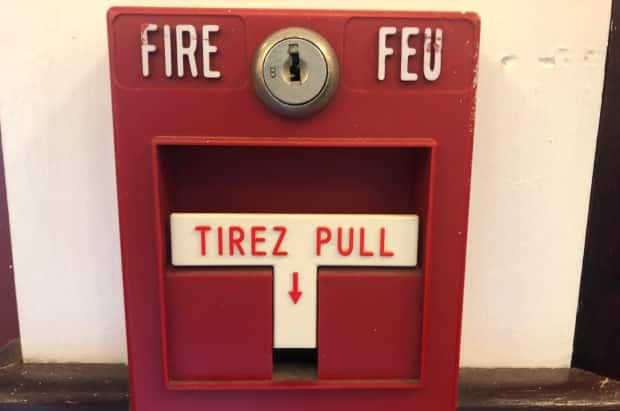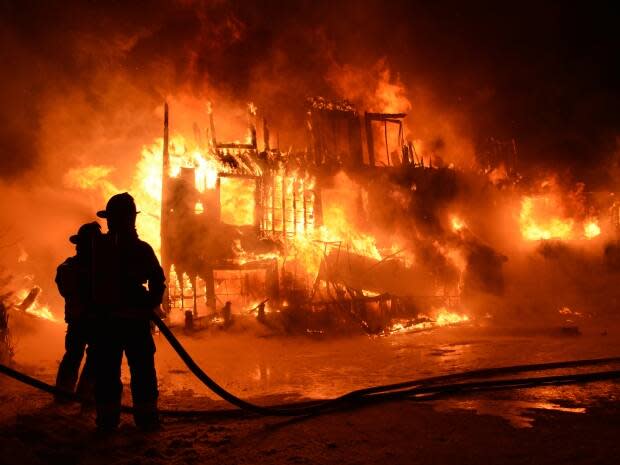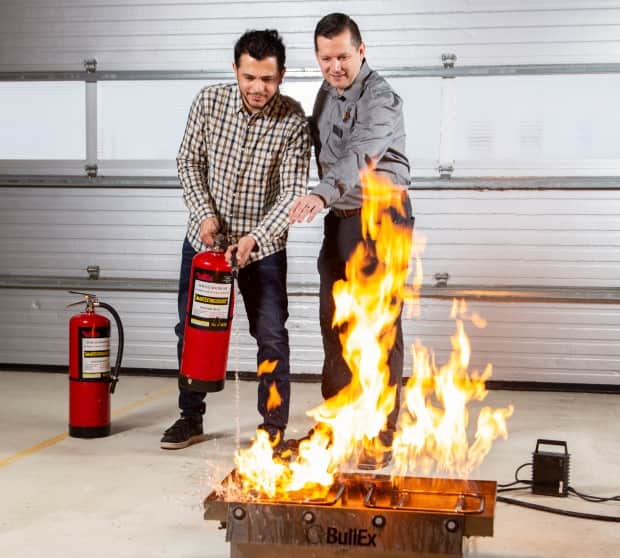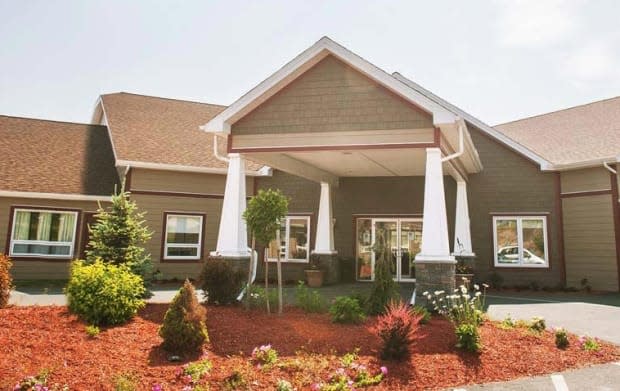Daughter raises alarm about safety in light of staff cuts, lack of fire drills at care homes
The possibility of a fire in a special care home with dozens of residents shuffling toward the nearest exit while pushing a walker is something Lise Dubois worries about.
Her elderly mother suffers from dementia, and she has seen what happens when a blaring fire alarm goes off, with three staff trying to evacuate 45 seniors in a hurry.
"It's pretty scary," Dubois said of the scene she witnessed when her mother lived at Manoir Sugarloaf in Campbellton.
A CBC News analysis of special care homes in New Brunswick, completed on Jan. 8, has found 24 per cent failed to meet fire prevention standards, with the most common infraction being a failure to do monthly fire drills.
Dubois worries that lack of preparation, combined with the ongoing practice of reducing overnight staff at care homes, could lead to "disaster" for some of the province's most vulnerable.
'Variances' often granted
Special care homes can be approved for a "variance" that allows the overnight staffing level to drop below the government standard of one caregiver per 10 residents.
"In some circumstances, a staffing variance may be approved of up to 1:15," wrote government spokesperson Coreen Enos.
The practice came to light in a recent CBC investigation into five special care homes owned by the Lokia Group. These homes took part in a government-approved pilot project that allowed staffing levels to be reduced, in some cases leaving workers alone overnight.
As of Nov. 20, 2020, a spokesperson for the Department of Social Development said 55 of the 491 adult residential facilities in New Brunswick, which includes special care homes, memory care homes and community residences, had been granted a nighttime variance.
Those variances are valid for one year and can be revoked at any time.

Resident 'stuck' in her room
Dubois remembers helping her mother, who uses a walker and moves slowly, to exit the home during that evening fire alarm.
With one staff for every 15 residents, she said it was "chaos" with everyone "freaking out."
"If it would have been a real fire, at least half to three-quarters of them wouldn't make it."
There's a lot of them that has a hard time to walk. And a lot of them has oxygen tanks, so they need help. - Lise Dubois
The Office of the Fire Marshal would not do an interview, but spokesperson Enos said in a written statement that staffing ratios always ensure "there is sufficient staff for evacuating residents in the event of a fire."
She said variances are granted only after the operator has completed a timed fire drill, and if Social Development has no concerns about the home.
Dubois said that during the evening fire alarm, as she was hurrying her mother down the hall toward the exit, another resident who was in a wheelchair opened the door of her room a crack to ask Dubois what was going on.
"She was kind of stuck in there," she said. "She needed help. So I stopped and I helped her and I brought her and my mom toward the front.
"There's a lot of them that has a hard time to walk. And a lot of them has oxygen tanks, so they need help."
Dubois's mother, who has dementia, has now moved out of the special care home and into a nursing home, but Dubois is still bothered by what she saw during that fire alarm.
"It really got me thinking a lot when I seen that — it's like Holy Lord — something like that had happened in an old people's home somewhere near Montreal."

In January 2014, a fire that broke out just after midnight in the Résidence du Havre, about 450 kilometres northeast of Montreal, took the lives of 32 of the 50 residents.
Many of the residents used walkers and wheelchairs, and a coroner's report blamed the high death toll in part on the lack of automatic sprinklers and insufficient overnight staff at the residence.
Expert says fire drills critical
In the most recent inspection reports for New Brunswick special care homes, as of Jan. 8, inspectors flagged 83 homes for not complying with fire prevention and safety standards.
Fire prevention expert Derek Gruchy said it's critical that fire drills are completed regularly, especially when you are dealing with vulnerable populations who may have reduced mobility and diminished cognitive abilities.
"The vast majority [of residents] are there because they need assistance. And so in the event of a fire, they can't just all get up and walk out, so they need help from the staff."

Gruchy is the co-ordinator of the fire protection engineering technology program at Seneca College in Toronto, and his students include future fire inspectors.
He said the number of residents, the number of exits, the distance to those exits and whether there are sprinklers all need to be considered when determining whether staffing levels are adequate and evacuation plans are safe.
"If you have one staff or three staff — I don't really care — I just want to make sure that it's safe. So if you can do it with one person, show me. And so you do these evacuations to show that."
Rules in New Brunswick 'very strict'
Jan Seely, president of the New Brunswick Special Care Home Association, understands why family members like Dubois are concerned. She didn't know anything about the pilot project at the five Lokia homes and says the variance never should have been approved.
"It's painted a very unfortunate picture of a sector that is undeserving of that picture," she said. "I hope that this type of thing doesn't happen again."

Seely operates a 12-bed care home in Saint John and has applied for a variance herself in the past, which allows her to have one staff person working during the night.
"The variance process is very strict," said Seely who does regular fire drills, has a sprinkler system and is confident all of her residents and staff can get out in two minutes. "When I go home at night, I know that can be done … it's one of my most important peace-of-mind issues."
Seely is calling for a peer-review committee to be set up that would include officials from the Department of Social Development, the Office of the Fire Marshal, the Special Care Home Association and care home operators. The committee would discuss requests for future pilot projects and staffing variances.
"Nobody knew this project was happening. So, you know, shame on government for doing that."

For Gruchy, the bottom line is that all special care home staff and residents have to be prepared should there be a fire — day or night.
"It's really important for the drills to just keep repeating the same thing over and over, so that when it is a real fire, everybody just knows what to do, and it's not a situation where people are looking around [wondering] 'Are you helping me? Where am I supposed to go?'"
